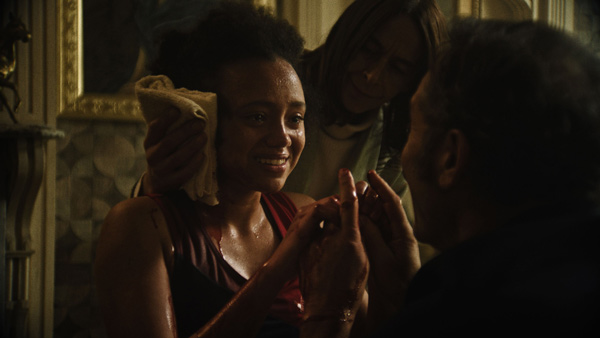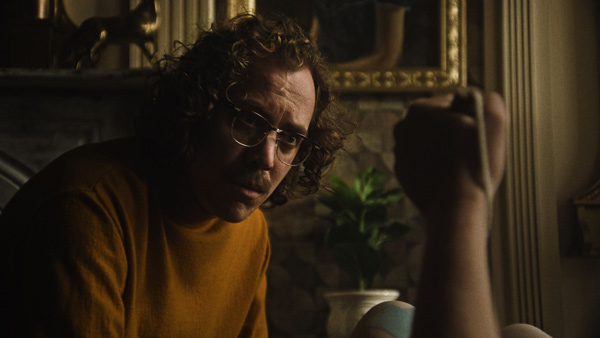Love Like This Before: Sims-Fewer & Mancinelli Examine the Ethics of Love
Canadian filmmaking duo Madeleine Sims-Fewer and Dusty Mancinelli follow up their disturbing 2020 relationship drama Violation (read review) with a more extravagant genre mixture in Honey Bunch, which careens from complex subtexts to full blown B-movie tropes. While not as archly unembellished as their previous venture, a moody intrigue saturates this genre exercise about a young woman suffering from amnesia who undergoes an experimental treatment at an isolated therapeutic facility to recover both her memory of and emotional capacity for her husband. A picture perfect scenario of the doting spouse quickly fades into what appears to be a sinister gaslighting exercise, where a startling ambiguity regarding the complicity of the program’s facilitators also plays a role cementing heteronormative patterns its female clients were subconsciously subverting through their own emotional agency.
Diana (Grace Glowicki) has recently recovered from a coma following a car accident. However, it left her with a significant amount of memory loss, which seems to have affected her marriage to Homer (Ben Petrie). He’s enrolled her in an isolated facility run by Farah (Kate Dickie), where clients undergo experimental treatments designed to recover memory through sensory simulations. Apparently, they’ve documented significant results for patients suffering from all sorts of memory issues, including dementia. Diana attends her sessions alongside another young woman, Josephina (India Brown), suffering from a similar ailment, joined by her partner Joseph (Jason Isaacs). However, the treatments don’t seem to be as successful for Josephina, who seems to suffer from more agonizing side effects the practitioners can’t seem to quell. Meanwhile, flashes of Diana’s memory return. But a portrait emerges suggesting her marriage to Homer wasn’t exactly a happy one.

Logically, the next stop on this narrative train would fly straight into Stepford, which seems to be an unavoidable comparison in Honey Bunch. But whereas the emasculated, fragile men in The Stepford Wives (1975) were trying to hollow out their trophy wives so they could be replaced with eternally doting automatons, there’s something more troubling about a similar destiny from the angle of good intentions. DP Adam Crosby (BlackBerry, 2023) encloses us in a dim, nocturnal environment of the isolated facility, where flashing light exercises are used to jostle the women’s memories. But if shining a light is a metaphor for unveiling truth, chopping it up into disorienting splinters forms a perversion of whatever their ‘truth’ might be. The suspiciously sparse staff, led by an initially disarming but increasingly sinister Katie Dickie, adds to a sense of Cronenbergian claustrophobia, like the experimental psychosomatic treatments administered by Oliver Reed in the classic The Brood (1979).

But as Honey Bunch begins to reveal the mechanisms at play, the suspense of disbelief eventually evaporates. What’s happening to Diana only begins to take shape based on the exacerbated dysfunction displayed by their comparative counterparts, Jason Isaacs’ Joseph and his troubled lover, India Brown’s Josephine (their names suggesting she is merely a figment of his dominant persona). In comparison, the names of Homer and Diana convey clashing compatibilities, if reading into their mythological allusions. Homer is the author, the controller of the text while Diana, the powerful goddess of the hunt, is a character ensconced in his design. Eventually, we learn Homer has approached his selfish desire to reclaim the Diana he loves through a humanitarian (but hardly cost effective) guise. We learn Diana, like the final vestige of Ellen Ripley in 1997’s Alien: Resurrection, is merely the most successful version in a series beings created in the reclamation of her physical and emotional awakening, and Homer apparently feels responsible for the livelihood of all the collateral damage in his pursuit of reclamation.

Where Honey Bunch feels most effective are in Diana’s reawakened memories, some of which, out of context, are immediately downplayed by Homer. It’s similar, in a sense, to Poor Things (2023), in which a reanimated protagonist is confronted by a figure from her past, only to learn when it’s almost too late he was the one who drove her to satisfy a death wish. But, predictably, a portrait emerges of a clingy male whose ‘love’ for his wife was clearly born out of a toxic attachment style neither of them had been able to articulate. Unfortunately, this all spins itself into a rather lackluster payoff, and the careful construction of the ethical implications of relationship obligations and unchecked boundaries dissipates into the underwhelming demands of its hybrid genre elements. In its final throes, Honey Bunch conjures the question which appears at some point in all relationships. At the end of the day, what’s love got to do with it?
Reviewed on March 1st at the 2025 Berlin International Film Festival (75th edition) – Berlinale Special Programme. 113 mins.
★★½/☆☆☆☆☆
“ ”


